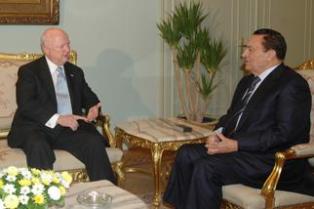US energy secretary Sam Bodman has acknowledged the importance of nuclear energy in future global energy strategies during a five-nation tour of the Middle East. Meanwhile, President George Bush has given his approval to a US-Turkey nuclear cooperation agreement in abeyance for nearly seven years. At the outset of Bodman's Middle East tour, the Department of Energy (DoE) described its purpose as enhancing US relationships with oil-producing nations, while promoting sustained investment in conventional and alternative energy sources, and encouraging improvements in global energy efficiency. Bodman's itinerary took in Jordan, Saudi Arabia, the United Arab Emirates (UAE), Quatar and Egypt.
At the outset of Bodman's Middle East tour, the Department of Energy (DoE) described its purpose as enhancing US relationships with oil-producing nations, while promoting sustained investment in conventional and alternative energy sources, and encouraging improvements in global energy efficiency. Bodman's itinerary took in Jordan, Saudi Arabia, the United Arab Emirates (UAE), Quatar and Egypt.
While in the UAE, Bodman addressed the Masdar Future Energy Conference in a keynote address focusing on the energy challenges facing the world and the huge investments needed to meet burgeoning primary energy demand over the coming decades. "The world needs safe, reliable, clean, affordable, and diverse energy supplies - and in considerably greater numbers than it now has," he told the audience. Beyond hydrocarbons, he went on to say, the world "absolutely" needed new energy options including increased nuclear power. Masdar is an initiative founded by the UAE in 2006 as a "global cooperative platform" addressing issues including energy security, climate change and sustainable development.
Bodman again mentioned nuclear's role in a meeting with Egypt's President Hosni Mubarak, noting that any global energy strategy "must include efforts to expand access to emissions-free nuclear power in a way that responsibly manages waste and dramatically reduces proliferation risks." He highlighted Egypt's participation in the US-led Global Nuclear Energy Partnership (GNEP), and when in Jordan praised that country's decision to sign up to the partnership under which so-called 'fuel-cycle' nations would provide assured supplies of nuclear fuel to client nations, which would generate electricity before returning the used fuel. Participating countries would not have to establish their own fuel cycle facilities and nuclear materials would be able to remain under the str ictest of non-proliferation controls. Unlike Jordan, Egypt has not yet signed up to become a member of GNEP, but did participate as an observer at the second ministerial meeting of the partnership in September 2007. The country has announced an intention to employ nuclear power at the El Dabaa site, near Alexandria, and is preparing legislation to facilitate this.
None of the countries in Bodman's itinerary yet have nuclear energy, although even the most oil-rich of the Gulf states are now giving serious consideration to the nuclear power option. Indeed, just prior to the US energy secretary's visit, France's President Nicolas Sarkozy took the opportunity of his own tour of Middle Eastern countries to sign a cooperation agreement on the peaceful uses of nuclear energy with the UAE, and French companies signed a partnership agreement to submit a nuclear power project to the UAE authorities.
US-Turkey deal resuscitated
Turkey's plans for nuclear power are still at an early stage but nevertheless are more advanced than those in the countries closer to the Gulf. US President Bush has this week given his approval to a US-Turkey cooperation agreement on the peaceful use of nuclear energy. The agreement was originally signed in July 2000 by then President Bill Clinton, but stalled immediately when 'US agencies received information that called into question their conclusions'. The White House said that certain 'private entities' in Turkey had been involved in activity 'directly relating to nuclear proliferation'.
Since that time Turkish authorities have taken corrective action, and the 'US secretary of state, the secretary of energy, and the members of the Nuclear Regulatory Commission are confident that the pertinent issues have been sufficiently resolved'.
Bush told Congress: "In my judgment, entry into force of the agreement will serve as a strong incentive for Turkey to continue its support for nonproliferation objectives and enact future sound nonproliferation policies and practices. It will also promote closer political and economic ties with a NATO ally, and provide the necessary legal framework for US industry to make nuclear exports to Turkey's planned civil nuclear sector.
If passed into law, it will permit the transfer of nuclear technology, materials and equipment - including nuclear power plants - from the USA to Turkey.
Turkey has not yet signed up to GNEP, and recent reports suggesting it is planning to set up its own nuclear fuel cycle facilities were greeted with dismay by the USA. However, the reality could be very different: the World Tribune reported that although Turkey has trained an estimated 1300-1400 nuclear scientists between 1960 and 1990, the vast majority of these have either left the country, changed fields or are now retired. Realistically, the country would need to embark on a massive training exercise and draw on significant amounts of overseas help if it were to launch its own program.




_28178.jpg)
_66891.jpg)
_30199.jpg)
_72306.jpg)





